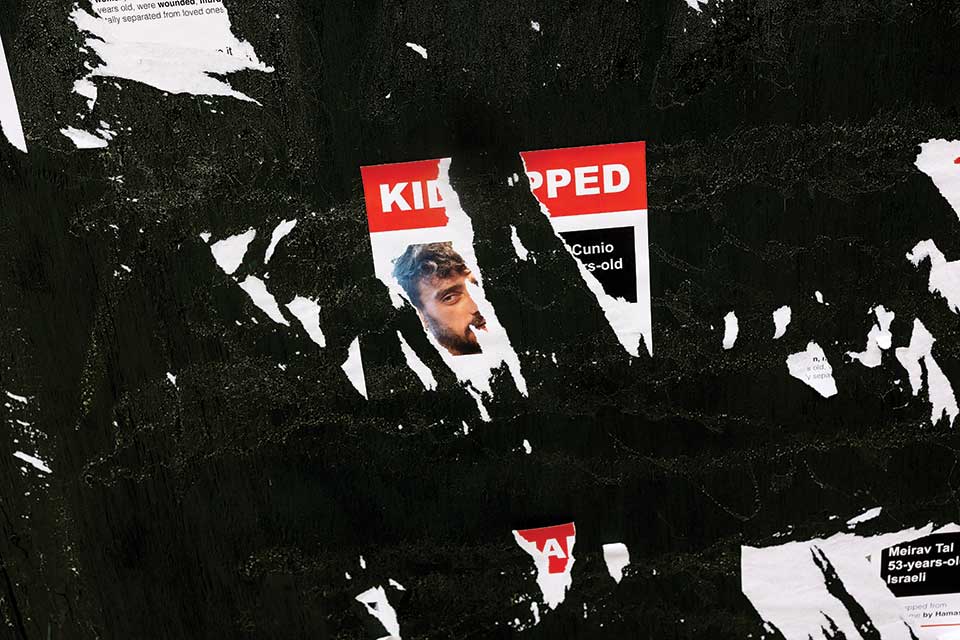Talking Past Each Other
Reporting from the field, an NPR journalist investigates the gulf between Israelis and Palestinians during the Israel-Hamas war.
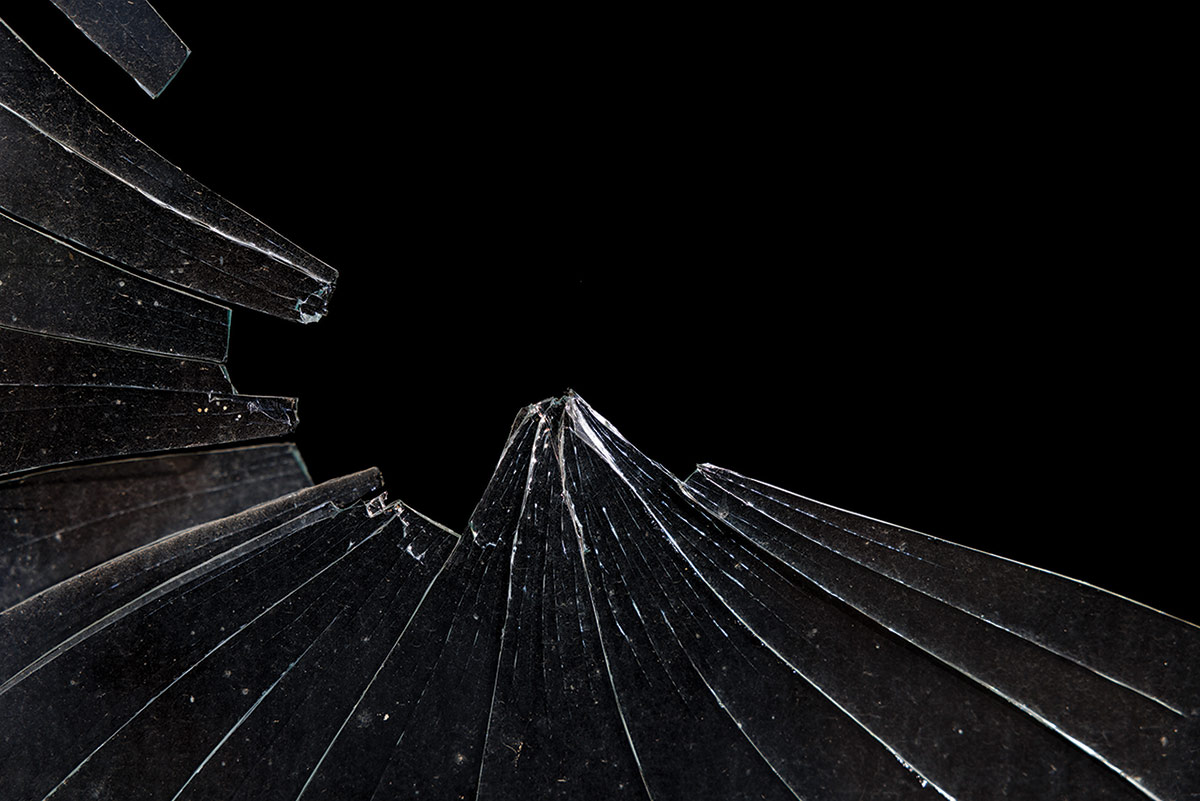
Photo Credit: Dan Kitwood / Getty Image
By Daniel Estrin ’06
The evening of Oct. 7, I drove to a hospital in southern Israel that was treating those wounded in the Hamas attack. Inside a hospital room stood Ilan Troen ’63, the Stoll Professor of Israel Studies, Emeritus, whose class I’d taken at Brandeis a decade and a half earlier.
He was wearing a Brandeis T-shirt, standing next to his grandson’s hospital bed. “My daughter and son-in-law were killed today but, in their dying, saved his life,” Troen said. They had flung themselves over their son as gunmen broke into their room; the bullet that pierced them entered his abdomen.
Nearly 100 days later, I visited Professor Troen in his home in southern Israel. “How are you?” I asked.
“How am I?” he said. “In Baroque music, there’s something called the basso continuo. And if you listen to Bach, there’s that bottom line that continues. And my basso continuo is one of sadness.”
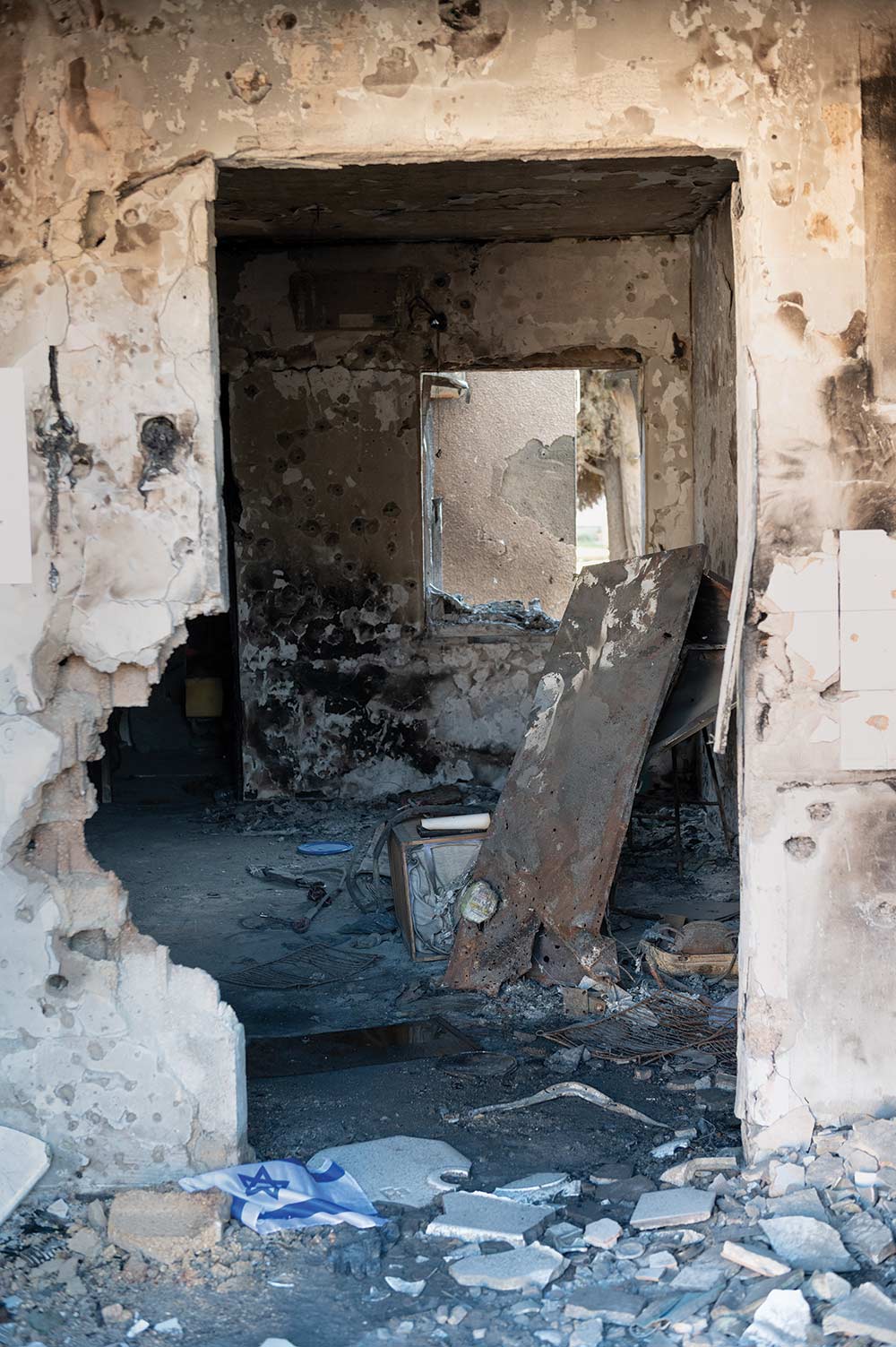
I asked Professor Troen what his daughter might think, if she were alive to witness those 100 days: Israel waging its war against Hamas in Gaza, bombing so many families and children. She had sent her children to a rare elementary school where Jewish and Arab kids study together, and had believed in the possibility of peace with her neighbors.
“I think she would be appalled and concerned, maybe angry,” he said. “But maybe she would understand.”
Israelis and Palestinians live so close to each other, yet in utterly different worlds. As an NPR journalist, I have crossed between the two worlds in ways most people living in them cannot.
In Israel, I reported on last year’s unprecedented protest movement. Israelis were pouring into the streets, demonstrating against the most right-wing, religious government in their history, holding a vibrant public debate about the very essence of their country.
For years, I crossed the heavily fortified border into Gaza to glimpse what Israelis cannot see: the daily battles of more than 2 million Palestinians living the Israel-Hamas dynamic of confines and conflict. I reported on a young man who reopened his chic coffee shop on a bombed Gaza street the day the 2021 war ended. I followed a retired audio engineer desperately waiting for Israeli permission to leave for lifesaving heart surgery in the West Bank.
These two worlds collided on Oct. 7 in the most grotesque way, and it took a long time before I could step back from the relentless work of war reporting to begin to take stock of all that was lost and would never be the same.
‘You can’t understand the big picture’
A few weeks into the war, Israel began opening up the assaulted kibbutz communities near the Gaza border so journalists could see them. There was no police tape; I wandered through homes ripped apart. Kitchen plates were strewn everywhere. A walker was tossed aside in the bedroom of a victim. Blood-soaked mattresses reeked. Something else caught my eye: Attackers had spray-painted their names and militant affiliations on the outside walls of some homes.
Who were the men who perpetrated this attack?
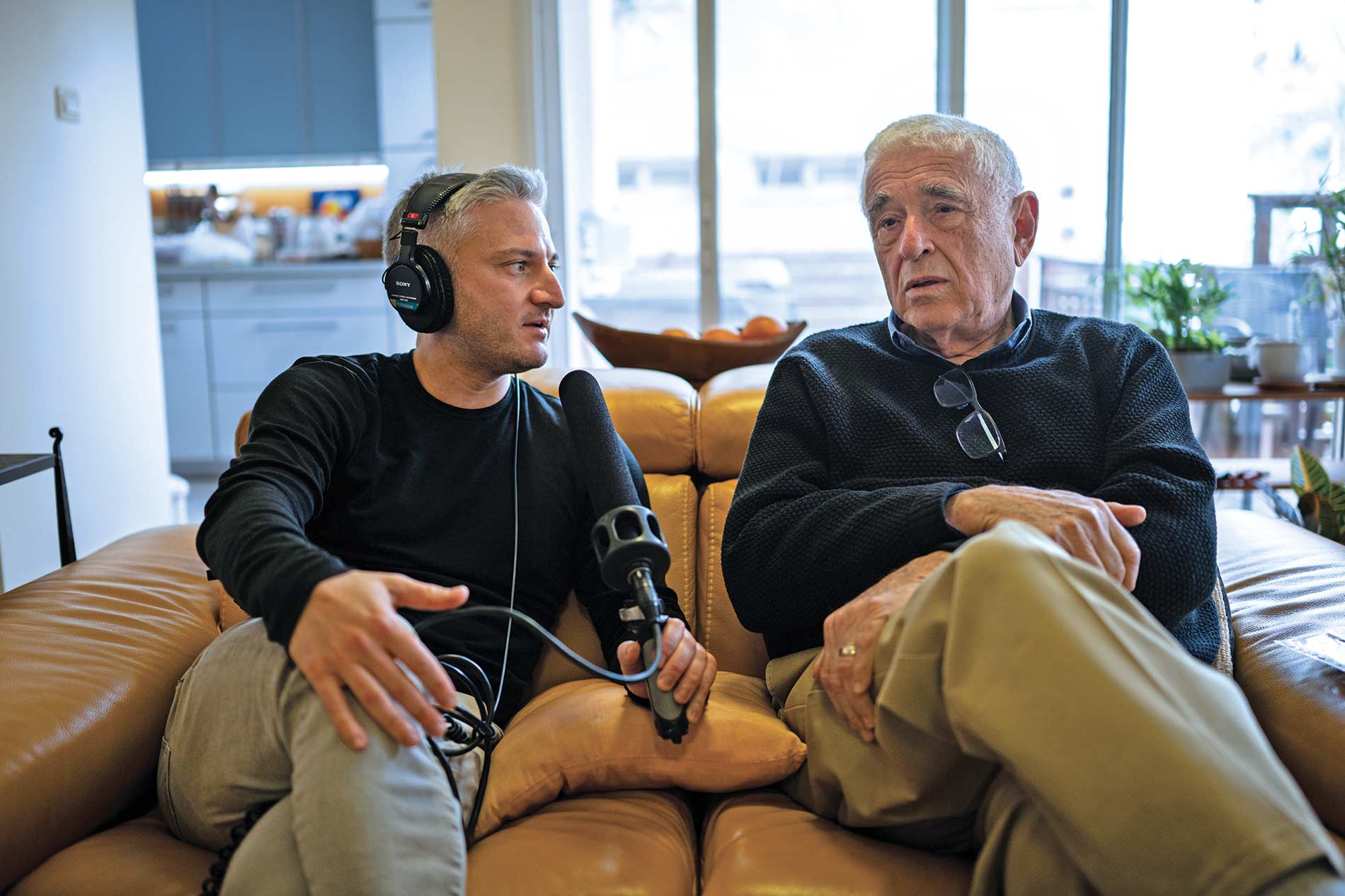
I work with a mighty team of journalists from Gaza, and the relationships and trust we built over years helped us tell this sensitive story. We fleshed out the contours of a 25-year-old named Mohammed, who had crossed into Israel on Oct. 7 and was killed in the attack. My NPR colleague Abu Bakr Bashir, from Gaza, landed rare interviews with Mohammed’s father and neighbor, who said he had led an ordinary life. He didn’t finish his high school matriculation exam. He’d worked as a taxi driver. He tried to start a business selling food products. He had a lot of friends and family at his wedding. But everyone in his family and neighborhood knew he belonged to the Palestinian militant group Islamic Jihad.
I called Mkhaimar Abusada, a political analyst at Al-Azhar University-Gaza, with whom I used to meet fre-quently on reporting trips to Gaza. He told me he had fled his home in Gaza City early in the war and was displaced in southern Gaza. I asked him what drew people like Mohammed to Gaza’s militant groups. He laid out some context: Many people in Gaza descend from families who were dispossessed from their homes as a result of the First Arab-Israeli War, when Israel was founded 76 years ago. Failed rounds of peace talks drove support for armed resistance against Israel. Poverty and unemployment, and 16 years of a strict Israeli-led blockade of Gaza entrenched that support. Militant groups offered people like Mohammed a steady salary and shaped their worldview.
Most Israelis do not see on the nightly news the everyday horrors that Palestinians have experienced. Most Palestinians have not seen footage of the horrors of Oct. 7 that Israelis have watched on a loop on their screens.
A month later, I met 21-year-old Israeli reservist Alon Keren. He spent two weeks serving inside Gaza after Oct. 7, then, during a brief cease-fire, came home, did his laundry, saw his parents and girlfriend, and sat with me in his backyard drinking beer the night before reporting back to duty.
His role was to supply combat soldiers in the Israeli military with water, food, chocolate, and beef jerky.
“The days for me are pretty simple,” he told me. “We wake up. We drink the coffee. You can see the beach, and it’s nice.” He felt secure in areas the military had conquered. “It’s not Gaza anymore,” he said.
He had not seen a single Palestinian. He had been staying in a home Palestinians had fled, sleeping on a cot on the ground. The windows were blown out. Flies gathered at his feet. Then he was moved to another building. He wasn’t sure what kind of home it was because it had a swimming pool. It sounded like one of the beach clubs I’ve visited in Gaza.
He offered a valuable perspective on the war — that of a foot soldier without his phone inside Gaza, unable to see the wider perspective. “You can’t understand the big picture,” he said.
The one time I felt I could see his inner world was when he described being in Gaza and wondering where the Israeli hostages Hamas had captured on Oct. 7 were being held. “Probably very close to me,” he said. “It felt very weird.” A few houses down from where we were sitting in his backyard was the home of a high school friend who was being held captive in Gaza.
One moment in particular stays with me: the morning the Israeli military announced its commandos rescued two Israeli hostages in Gaza and carried out a massive bombing campaign to provide cover for the forces. NPR’s producer in Gaza, Anas Baba, sent me a recording he collected at a Gaza hospital. It was the voice of a Palestinian mother in Gaza, wailing. Her son was one of many who were killed in Israel’s bombings. I was driving in Tel Aviv, listening to the recording of her cries, as an Israeli drove by on a motorcycle with a bumper sticker that read “Go IDF,” a sign of support for the Israel Defense Forces.
It has become impossible for journalists to enter Gaza independently. It is a challenge to cover a war you cannot be on the ground to see with your own eyes.
One people’s triumph, another people’s tragedy. Two irreconcilable worlds.
Most Israelis do not see the everyday horrors that Palestinians have experienced when they tune in to the nightly news. Most Palestinians have not seen footage of the horrors of Oct. 7 that Israelis have watched on a loop on their screens.
I attended a screening of the footage the Hamas attackers themselves filmed on Oct. 7. I have seen the images of skeletons and body parts in the streets of Gaza.
I never used to be someone who remembers his dreams, and now I have woken up from vivid nightmares.
Routine and ruin in Gaza
Since the war began, it has become impossible for journalists to enter Gaza independently. You can enter only if you embed with the Israeli military. I’ve served on the board of the Foreign Press Association in Israel and the Palestinian territories, and we petitioned the Supreme Court of Israel in December to allow international journalists independent access to Gaza. We lost that case.
It is a challenge to cover a war you cannot be on the ground to see with your own eyes.
Many local journalists based in Gaza have fled since the war began. NPR became one of the last U.S. news organizations with a producer there. Anas Baba has maintained his composure despite living through the most extreme conditions.
Early in the war, he and his family fled Gaza City in the north to go to his uncle’s building in the southern-most part of Gaza. As the Israeli military went from north Gaza to central Gaza, approaching south Gaza, more and more of his extended family arrived at the building where he has been sheltering. First 70, then 120, then 180 people shared five bathrooms.
“Each family needs to clean the bathroom three times a day,” Anas explained to me. “We have a routine for who’s going to make the dinner tonight. We have a routine for which family is going to make the lunch and what exactly is the lunch going to be. We are now relying on rice and flour.”
As supplies dwindled, he began eating one meal a day. He and his family get flour rations from the U.N. and whatever they can buy on the black market. Often he struggles to connect to the internet to send us the audio, video, and photos he’s been collecting.
Once he described the blast of an Israeli strike nearby. He jumped into his car, and drove through the clouds of dust and debris still filling the air. He couldn’t see through the windshield. He followed the flashing red light of the ambulance in front of him.
He has tape-recorded his own voice describing in graphic detail the bodies of young children he sees. And he has watched young children sheltering at hospitals who witness bodies being laid out. There are parts of Gaza that even Anas himself could no longer access. Israel prevented more than 1 million Palestinians, who, like him, fled the fierce combat in north Gaza and Gaza City to shelter in the south, from returning north.
We asked one of the remaining photojournalists in Gaza City to document what became of historical and cultural landmarks that were the pride of Gaza, like the old mosque that had previously been a Crusader church, and the Samaritan bathhouse, the last Turkish hammam of Gaza. Almost every one of these beautiful places that I myself have visited — that had survived centuries of upheaval — were left in ruins by Israeli bombings targeting Hamas.
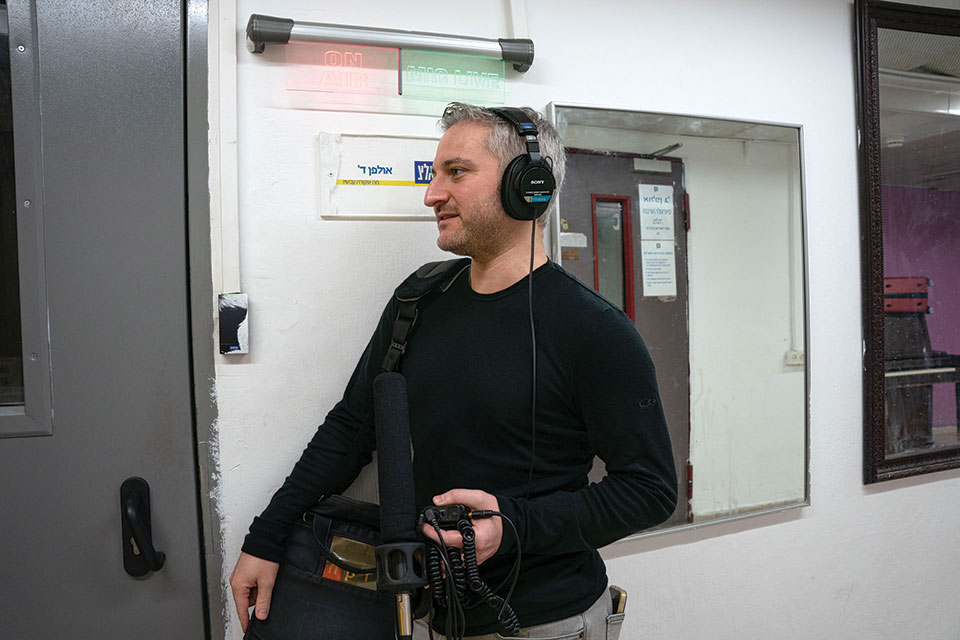
Crisscrossing messages
Turn on the radio in Israel or Gaza, and you can flip between Israeli and Palestinian radio stations easily. The airwaves cross one another in the same tiny geographical space.
My team and I visited an Israeli radio station broadcasting to Gaza, trying to deliver families’ voice messages to Israeli hostages held there, after some released hostages said they had heard Israeli radio in captivity.
NPR played a clip of one such Israeli radio broadcast. It was the voice of Gil Dickmann, talking about his two relatives who were taken to Gaza. After one was released, she said she had heard that broadcast in Gaza. “She said that that was one of the most important things for her while she was in captivity, keeping her strong, knowing that her husband and child are still alive, and that we fight for her,” Dickmann said.
We also visited a Palestinian radio station broadcasting Palestinians’ voice messages to their relatives in Israeli jails following a surge of arrests after Oct. 7. Hundreds of Palestinians were recording messages for the radio station to broadcast, even though Israel confiscated prisoners’ radios when the war began.
NPR played a clip of one such Palestinian radio broadcast. It was the voice of Dima Ali: “Hi, Dad. Don’t worry about us. Everything’s OK.” She hoped the message would reach her father, who was taken away by Israeli soldiers five days into the war, along with many other detainees held without charge. He had been arrested in the past on accusations of having ties with Hamas, which his family denies.
Radio can transport you to someone else’s universe. It is the most intimate form of storytelling I know. Stopping to listen is an act of empathy.
But the two radio station managers I met, Israeli and Palestinian, resisted comparing their initiatives. Why would they? Israelis and Palestinians are speaking over each other now. They are not putting their pain side by side. They are speaking to the losses of their own people.
Daniel Estrin is an international correspondent for NPR. This essay was adapted from an episode of the NPR podcast “Embedded.” Listen at n.pr/3W5NXVN.
